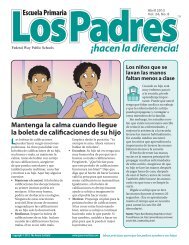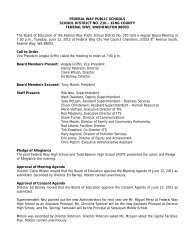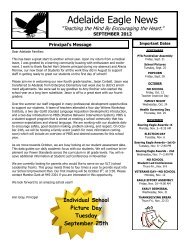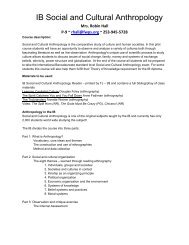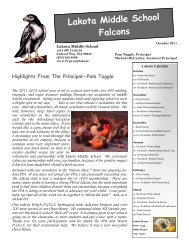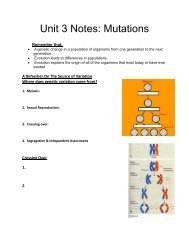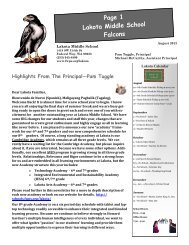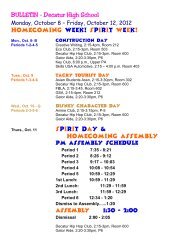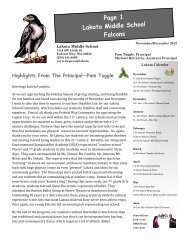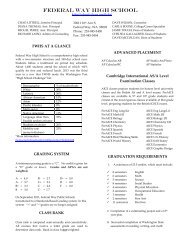High School Book LIst - Federal Way Public Schools
High School Book LIst - Federal Way Public Schools
High School Book LIst - Federal Way Public Schools
You also want an ePaper? Increase the reach of your titles
YUMPU automatically turns print PDFs into web optimized ePapers that Google loves.
Title Author<br />
<strong>High</strong> <strong>School</strong> Supplementary Reading List<br />
Content<br />
Habibi Ny, Naomi Shibab The day after Liyana got her first real kiss, her life changed forever. Not because of the kiss,<br />
but because it was the day her father announced that the family was moving from St. Louis all<br />
the way to Palestine. Though her father grew up there, Liyana knows very little about her<br />
family's Arab heritage. Her grandmother and the rest of her relatives who live in the West Bank<br />
are strangers, and speak a language she can't understand. It isn't until she meets Omer that<br />
her homesickness fades. But Omer is Jewish, and their friendship is silently forbidden in this<br />
land. How can they make their families understand? And how can Liyana ever learn to call this<br />
place home?<br />
Hamlet Shakespeare This is a tragedy involving the unyielding hunt by a prince for his father‘s murderer. Many<br />
powerful confrontations occur within this tragedy and during, prior to, and after these<br />
exchanges, one explores the depths of human emotion. Note: This book may contain<br />
offensive material.<br />
Handmaid‘s Tale, The Atwood, Margaret This satiric tale introduces us to Offred, a Handmaid in the Republic of Gilead. Her life is a<br />
political warning. She may leave the home of the Commander and his wife once a day to walk<br />
to food markets whose signs are now pictures instead of words because women are no longer<br />
allowed to read. She must lie on her back once a month and pray that the Commander makes<br />
her pregnant, because in an age of declining births, Offred and the other Handmaids are only<br />
valued if their ovaries are viable. Sexual situations.<br />
Haveli Staples, Suzanne<br />
Fisher<br />
The world of Newbery Honor book Shabanu is vividly re-created in this novel of a young<br />
Pakistani woman's heartbreaking struggle against the tyranny of custom and ancient law.<br />
Shabanu, now a mother at 18, faces daily challenges to her position in her husband's<br />
household, even as she plans for her young daughter's education and uncertain future. Then,<br />
during a visit to the haveli, their home in the city of Lahore, Shabanu falls in love with Omar, in<br />
spite of traditions that forbid their union.<br />
Heart of Darkness Conrad, Joseph Novella by Joseph Conrad, first published in 1902 with the story "Youth" and thereafter<br />
published separately. The story reflects the physical and psychological shock Conrad himself<br />
experienced in 1890, when he worked briefly in the Belgian Congo. The narrator, Marlow,<br />
describes a journey he took on an African river. Assigned by an ivory company to take<br />
command of a cargo boat stranded in the interior, Marlow makes his way through the<br />
treacherous forest, witnessing the brutalization of the natives by white traders and hearing<br />
tantalizing stories of a Mr. Kurtz, the company's most successful representative. He reaches<br />
Kurtz's compound in a remote outpost only to see a row of human heads mounted on poles. In<br />
this alien context, unbound by the strictures of his own culture, Kurtz has exchanged his soul<br />
for a bloody sovereignty, but a mortal illness is bringing his reign of terror to a close. As<br />
Marlow transports him downriver, Kurtz delivers an arrogant and empty explanation of his<br />
deeds as a visionary quest. To the narrator Kurtz's dying words, "The horror! The horror!"<br />
represent despair at the encounter with human depravity--the heart of darkness. Note: This<br />
book may contain offensive material.<br />
Hedda Gabler Ibsen, Henrik Drama in four acts by Henrik Ibsen, published in 1890 and produced the following year. The<br />
work reveals Hedda Gabler as a selfish, cynical woman bored by her marriage to the scholar<br />
Jorgen Tesman. Her father's pair of pistols provide intermittent diversion, as do the attentions<br />
of the ne'er-do-well Judge Brack. When Thea Elvestad, a longtime acquaintance of Hedda's,<br />
reveals that she has left her husband for the writer Ejlert Lovborg, who once pursued Hedda,<br />
the latter becomes vengeful. Learning that Ejlert has forsworn liquor, Hedda first steers him to<br />
a rowdy gathering at Brack's and subsequently burns the reputedly brilliant manuscript that he<br />
loses there while drunk. Witnessing his desperation, she sends him one of the pistols and he<br />
shoots himself. Brack deduces Hedda's complicity and demands that she become his<br />
mistress in exchange for his silence about the matter. Instead, she ends her ennui with the<br />
remaining pistol. The work is remarkable for its nonjudgmental depiction of an immoral,<br />
destructive character, one of the most vividly realized women in dramatic literature. Note:<br />
This play may contain offensive material.<br />
<strong>High</strong> <strong>School</strong> 2011-12



